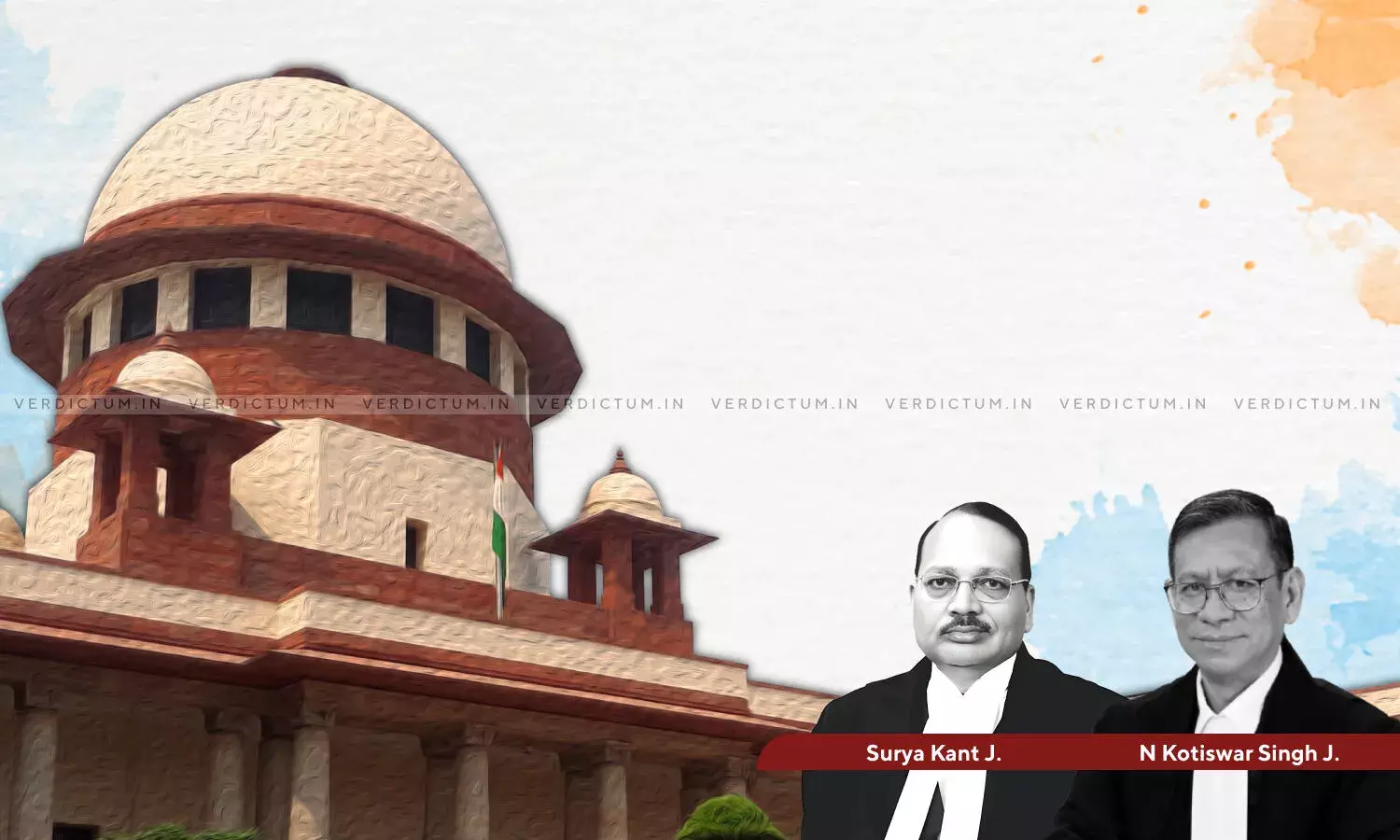Restricts Legal Right To Derive Commercial Benefit From Property: Supreme Court Vacates Injunction Against Land Owner In Tenancy Case
The appeal before the Supreme Court was directed against the order restraining the Appellant from creating any third-party interest in the disputed premises.

Justice Surya Kant, Justice Nongmeikapam Kotiswar Singh, Supreme Court
Expounding on the law governing the grant of an interim injunction, the Supreme Court has set aside a Bombay High Court's order restraining the owner of the property from creating any third-party interest in the disputed premises in a tenancy case. The Apex Court held that injunction significantly circumscribed the owner’s legal right to derive commercial benefit from his property.
The appeal was directed against the order passed by the Bombay High Court restraining the Appellant from dispossessing the first Respondent or creating any third-party interest in the disputed premises.
The Division Bench of Justice Surya Kant and Justice Nongmeikapam Kotiswar Singh held, “Applying the principles delineated above to the facts at hand, we are of the considered view that the High Court erred in granting the injunction in favour of Respondent No.1. We say so for the reason that the Appellant is incontrovertibly the absolute owner of the property, with the disputed area constituting merely a fraction of the entire premises. The Appellant has already entered into an agreement to redevelop the property. In these circumstances, the restraint imposed by the impugned injunction significantly circumscribes the Appellant’s legal right to derive commercial benefit from his property.”
Factual Background
The Appellant’s father was the owner of a plot admeasuring 22,000 square feet at Vittalwadi, Ghatala Village, Chembur, Mumbai. Out of the said area, the Appellant’s father leased out 11,250 square feet, i.e. the subject land, to a partnership firm, namely M/s Silver Chem (India) (second Respondent), which was owned by the Vijan family members in 1972. Upon the death of his father, the entire property devolved upon the Appellant. The Appellant terminated the above-mentioned lease agreement and filed an Eviction Suit.
The first Respondent, claiming to be the legal heir of one of the partners of the second Respondent, was allegedly running a business from the suit structure. Following the surrender of tenancy rights by the second Respondent and its partners, the Appellant unconditionally withdrew the Eviction Suit. The Appellant then effected a leave and license agreement with M/s KMG Global over a built-up area of 2,200 square feet.
Thereafter, the first Respondent, asserting his status as one of the partners of the second Respondent, based on the Family Settlement Agreement, filed a suit before the Small Causes Court seeking declaration of his tenancy rights concerning an undivided area of 550 square feet purportedly forming part of the premises leased to the second Respondent. The Small Causes Court granted interim protection to the first Respondent, but the appellant’s appeal against the same was allowed. The first Respondent’s Writ Petition came to be allowed, and the High Court granted an injunction in favour of the first Respondent. Aggrieved thereby, the Appellant approached the Supreme Court.
Reasoning
The Bench explained, “The law governing the grant of interim injunction is well-settled. This Court, through a catena of decisions, has consistently held that before granting an interim injunction, the Court must satisfy itself of three essential prerequisites: firstly, the existence of a prima facie case in favour of the applicant evincing a reasonable probability of success at trial; secondly, that the balance of convenience lies in favour of granting the injunctive relief; and thirdly, that the applicant would suffer irreparable injury or harm not adequately compensable in damages if the injunction is refused. It is only when these three conditions are cumulatively fulfilled that an interim injunction ought to be granted.”
The Bench was of the view that the High Court erred in granting the injunction in favour of the first Respondent as the Appellant was incontrovertibly the absolute owner of the property, with the disputed area constituting merely a fraction of the entire premises. It was further noticed that the first Respondent had failed to establish a prima facie case in his favour, as the question of tenancy rights claimed by him was pending adjudication before the Small Causes Court. Concerning the balance of convenience, the Bench held that it decidedly tilted in favour of the Appellant, considering that the disputed area was merely 550 square feet out of the total area of 22,000 square feet, and the Appellant has already entered into a leave and license agreement with M/s KMG Global covering a built-up area of 2,200 square feet.
“The injunction has thus inordinately impeded the entire redevelopment project for a relatively small disputed portion. Moreover, the Appellant would suffer irreparable injury if the injunction is allowed to operate, given that the protracted delay is not only causing substantial financial losses but also affecting the Appellant’s contractual obligations, which cannot be adequately compensated at a belated stage”, it said while also adding, “Conversely, Respondent No. 1 would not suffer any irremediable loss as his alleged tenancy rights over an area measuring 550 square feet can be adequately safeguarded.”
Thus, allowing the appeal, the Bench set aside the impugned order of the High Court. “However, with a view to balance equities, the Appellant is hereby directed to keep one unit measuring about 550 square feet reserved in the developed property as a security to protect the alleged rights of Respondent No.1, in the event that the Suit pending before the Small Causes Court is decided in his favour”, it concluded.
Cause Title: Tushar Himatlal Jani v. Jasbir Singh Vijan & Ors. (Neutral Citation: 2025 INSC 663)

